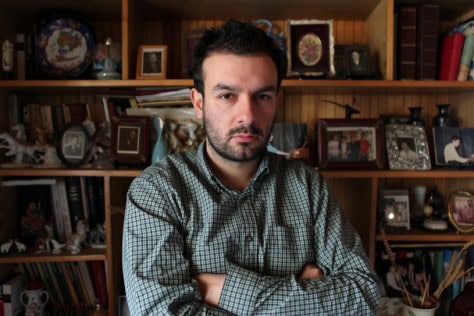Nick Flynn's wildly popular debut memoir, Another Bullshit Night In Suck City, was an uncompromising look at family trauma, homelessness, and alcoholism. Like Dave Eggers's Heartbreaking Work of Staggering Genius or Stephen Elliott's The Adderall Diaries, Flynn's book proved that memoir could still be pushed in fresh directions (and that great literature can still be alchemized from tragedy.) The author, who is also a poet, recently released a second memoir: The Ticking Is The Bomb. In it he examines his own impending future as a father-to-be in an America that can officially sanction the sort of global torture most visibly exposed at Abu Ghraib.
Flynn chatted with Anthem via email about James Frey, the nature of memoir, and what whale deaths have to do with pyramids of naked prisoners.
We understand by now that memory is a fickle beast — that there’s no such thing as perfect recall, and that we can’t accept non-fiction as an unquestionable document of ‘what happened.’ Still, where’s the line between poetic license and simply making shit up, as James Frey so infamously did in his debut ‘memoir’?
Frey once defended himself by saying that he only made up some small percentage of those memoirs — ten or twenty percent, I forget what he said. I’m not sure if he would still say that, but the trouble with that thinking is that it acts as if there is no cause and effect. That if you say, for example, that you were afraid of going to prison on page ten, the reader will not remember by page fifty that this fear is, or should be, coloring all your actions. I read The Snow Leopard recently, by Peter Matthiessen, and I thought of Frey. Matthiessen lets us know, very softly, in one part of one sentence in the first chapter, that his wife had died the year before the events chronicled in the book. The book takes place in the Himalayas, and yet everything gets colored by this grief, even if Matthiessen only mentions her in passing, from then on. It contains the tension of the entire book. If it had been false, if his wife hadn’t died, then the entire book would be a dead object, from page one, because of cause and effect. There is a physics to the world, which non-fiction has a contract to stand in awe of, otherwise it becomes completely self-centered and ego-driven, which is the death of a memoir.
The Ticking is the Bomb is about both America’s role as a torturer in the world (at Abu Ghraib, specifically), and your impending fatherhood. What did all this research on torture do to your psyche, especially at that point in your life — when you’re planning on bringing a child into the sort of world that condones all this vileness?
The thing about larger political — or environmental — realities, is that they exist within us all the time anyway, whether we acknowledge them or not. Those photographs seeped into everyone’s psyches, just as every time a whale gets killed we all feel it. We might not know that’s what we’re feeling, we might do something fucked up and blame it on the guy driving on the highway behind us like a maniac, but we’re all caught up in these patterns. The decision to have a child was, for me, fortunately, mostly a movement out of these shadow psychic realms.
David Shields’s upcoming ‘manifesto,’ Reality Hunger, calls for new forms of writing that blur the line between genres like autobiography, journalism, literary theory, the novel, etc. He seems pretty fed up with fiction, as if it’s a waste of time when one can be tackling the more serious work of essays or memoir. How do you feel about fiction? Do you ever see yourself writing a novel — is there something you could achieve in fiction that the memoir form does not allow?
Shields seems simply fed up with boring fiction, not all fiction, as far as I can tell. Who can argue with that? I’ve read part of Reality Hunger, and I think it’s great — thrilling. It’s a manifesto, and so, by definition, it’s going to state something in the strongest terms, to shake up some entrenched ideas. And then as soon as a manifesto is published someone, usually younger, will need to do the exact opposite. It’s how the culture lurches forward. I would disagree that any one form should dominate the others, that these hybrid texts (which I am also more interested in these days) should replace narrative. Any book that’s written well has it’s place. I’m more interested texts, either narrative or hybrid or whatever, that engage the reader in an active, rather than a passive, way. I think Shields would say that as well.
What memoirists would you recommend to someone who is interested in what the genre can accomplish in the right hands?
So many friends and others are working in this genre that it is just easier to defer to John D’Agata, who has just published his second anthology of essays, The Lost Origins of the Essay, published by Graywolf. His first anthology, The Next American Essay, has an amazing range of voices and forms, and is a very good place to start. John also has two memoir/essays of his own, which are great.
I’m willing to assume that this wasn’t meant to be taken wholly seriously, but…one blurbed review of Another Bullshit Night in Suck City, from GQ, says the following: “In a perverse act of divine intervention, a life worth writing about was bestowed on a man actually able to write.” It seems like that particular reviewer is a bit fed up with the glut of autobiography and memoir on the shelves today — sick of the idea that ‘everyone has a story to tell.’ What do you think? Are we confessing too much, writing too many memoirs, stupidly assuming that each individual life is worth printing?
A life worth writing about? Aren’t all lives worth at least that? When I read that I understood the reviewer was saying that memoir seems like an easy way out, that one doesn’t need to be an artist to write one, but doesn’t the same holds true for all writing, not just memoir? This moment in time, with reality TV and a seeming glut of memoirs, could be seen as a form of democratization, when voices who hadn’t had a chance to tell their stories are given a chance. And I think, if it is done with integrity, it can make the world fuller. Whether or not it’s art, and will survive, that’s another question. But maybe it’s enough that it exists in one moment. I actually almost never watch any reality TV at all, except in hotel rooms, and which always seems a kind of hell.
The Ticking Is The Bomb is on sale now
 Q&A with Larry Gus
Q&A with Larry Gus We Own the Night: The Edison
We Own the Night: The Edison
No Comments